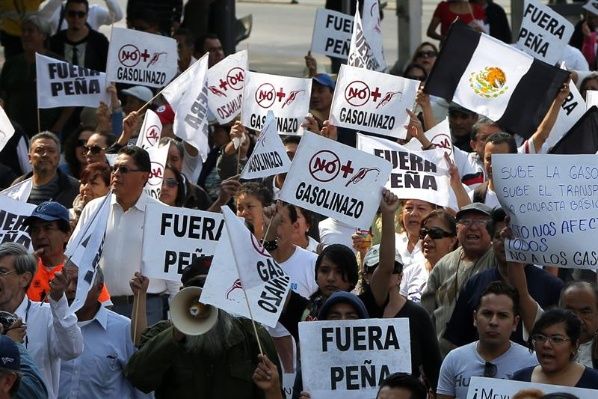Thousands of demonstrators took to the streets across Mexico for the second day in a row to protest a spike in fuel prices that critics say will batter the country’s agricultural sector and food security.
RELATED:
Mexico Plunges into Fresh Crisis as Fury Swells over Gas Prices
Transport workers, campesino organizations and other demonstrators blocked highways and supply terminals in Chihuahua and Morelos states, among other locations, local media reported.
On Sunday, hundreds of protesters marched in Mexico City carrying signs and shouting slogans including “Out with Peña,” targeting Mexican President Enrique Peña Nieto, and “No to the Gasolinazo,” as the price hikes that came down Jan. 1 have been dubbed.
The growing show of anger and frustration came after Mexico’s Ministry of Finance announced last week that gasoline prices would jump by 20.1 percent and diesel prices by 16.5 percent at the beginning of 2017 as years of state-regulated fuel prices come to an end.
Some protesters blamed the government for failing to put adequate investment into the country’s energy sector, leading to the contested hikes.
“It's a demonstration of complete rejection of what the government has done,” demonstrator Maricarmen Gonzalez told Reuters about Sunday’s protest. “The gasoline issue is the last straw the country needed to further destroy itself.”
On Sunday, the day the fuel costs were set to rise, many gas stations displayed signs that fuel was not available due to lack of supply as many rushed to fill up before the price hikes took effect, local media reported.
Critics have accused Peña Nieto and other government officials of ransacking Mexico’s state oil company, Pemex, which has undergone a gradual privatization process in recent years that has broken up the longstanding monopoly. Recent reforms have opened the door for private companies to set up gas stations and extract fossil fuels for the first time since the 1930s, busting Pemex’ control.
Gerardo Noriega Altamirano, a professor and researcher at the Mexico’s Chapingo Autonomous University, warned that the price increases will negatively impact campesinos and large-scale farming, which could jeopardize agricultural production and food security.
The expert argued that the fuel price changes is set to increase the price of tortillas, a staple food product in Mexico, while spiking the cost for corn producers by 20 percent.

“With a kilo of maize we can produce 1,600 grams of masa and, with it, a kilo and a half of tortillas,” he explained. “This price of this food product could be some 20 percent more and reach 14.40 pesos per kilo.” In 2007, the Tortilla Price Stabilization Pact limited the price of tortillas to 8.50 Mexican pesos per kilo.
OPINION:
Mexico: State Terror, Education Reform and the Stock Exchange
Increases in the price of basic food stuffs like tortillas will hit Mexico’s poor the hardest.
Noriega Altamirano added that the Mexican government should revise policies behind the fuel hikes in light of the consequences for food production, especially basic grains.
Mexico’s agricultural sector has already suffered under the North American Free Trade Agreement between Mexico, Canada and the United States. NAFTA critics have long argued that the 1994 deal negatively impacted food security and undermined Mexican farmers. With local markets increasingly flooded by cheap, foreign-subsidized imports, such as corn and other basic grains, Mexican farmers could not complete.
The latest blow to poor Mexicans and the country’s agricultural producers could add to Peña Nieto’s dismal approval ratings amid discontent over widespread human rights violations, corruption scandals and unpopular neoliberal reforms that have embattled the government.
Last August, Peña Nieto’s approval rating dipped to 23 percent, according to Mexico’s Reforma, a low not seen since the newspaper began polling in 1995.